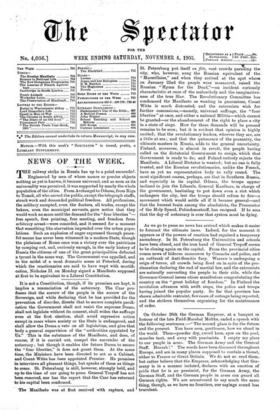It is not a Constitution, though, if its promises are
kept, it implies a renunciation of the autocracy. The Czar pro- fesses that the sorrow of the people is the sorrow of the Sovereign, and while declaring that he ha e provided for the prevention of disorder, directs that to secure complete pacifi- cation the Government shall not resist the supreme Duma, shall not legislate without its consent, shall widen the suffrage even at the first.. election, shall avoid repressive action except in cases where society or the State is endangered, and shall allow the Duma a veto on all legislatictn, and give that body a general supervision of the "authorities appointed by Us." This is the substance of the Manifesto, and does, of course, if it is carried out, compel the surrender of the autocracy ; but though it enables the future Duma to secure the "four liberties," it does not grant them. At the same time, the Ministers have been directed to act as a Cabinet, and Count Witte has been appointed Premier. He promises in interviews all pleasant things, but speaks of them as things to come. St. Petersburg is still, however, strongly held, and up to the time of our going to press General Trepoff has not been removed, nor has the report that the Czar has returned to his capital been confirmed.
The Manifesto was at first received with rapture, and


























































